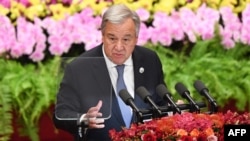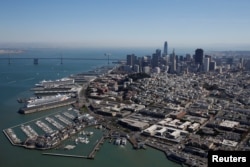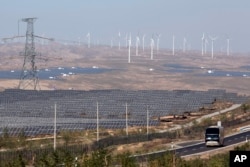U.N. Secretary-General António Guterres warned Monday that climate change is moving faster than efforts to combat it and that the international community needs to “put the brake” on greenhouse gas emissions, which drive global warming.
“If we do not change course by 2020, we risk missing the point where we can avoid runaway climate change with disastrous consequences for people and all the natural systems that sustain us,” Guterres told a gathering of youth, business leaders and diplomats at U.N. headquarters.
“We are careening towards the edge of the abyss,” he said, standing at a podium in front of a rain-splattered window. “It is not too late to shift course. But every day that passes means the world heats up a little more, and the cost of our inaction mounts.”
The U.N. chief renewed his call for action on the eve of the Global Climate Action Summit in San Francisco. California announced Monday that it is committing to 100 percent clean electricity by 2045.
The summit aims to mobilize international and local leaders from states, cities, business and civil society with national government leaders, scientists, students and nonprofits.
Paris agreement
Guterres said the targets agreed to in the 2015 Paris Climate Accord are the “bare minimum” to avoid the worst impacts of climate change. In the agreement, world leaders committed to stop global temperatures rising by 2 degrees Celsius above pre-industrial levels and to keep it as close to 1.5 degrees as possible.
“But scientists tell us that we are far off track,” he cautioned, noting these commitments represent just one-third of what is needed.
“We need to shift away from our dependence on fossil fuels,” Guterres said. “We need to replace them with clean energy from water, wind and sun.”
The U.N. says that the planet is still consuming 85 percent of its energy from fossil fuels and only 15 percent from renewable energies, including nuclear wind and solar power.
The United States, which is the only country to have signed and then withdrawn from the Paris accord, has loosened federal regulations on the fossil fuel industry under President Donald Trump's administration. Trump has also vowed to save the coal industry.
Guterres urged governments to end subsidies for fossil fuels and institute carbon pricing that reflects the true cost of greenhouse gas emissions.
He said the rise of renewable energy has been “tremendous.”
“Today, it is competitive with — or even cheaper — than coal and oil, especially if one factors in the cost of pollution.”
Guterres singled out China, a major polluter, for investing $126 billion last year in renewable energy — a 30 percent increase over 2016. He noted that countries that have long depended on oil, such as the Arab Gulf states and Norway, are looking at ways to diversify their economies away from fossil fuels.
“We know what is happening to our planet,” Guterres said. “We know what we need to do. And we even know how to do it. But sadly, the ambition of our action is nowhere near where it needs to be.”
‘Vast opportunity’
Guterres said the transition to cleaner energy and lower carbon emissions can have great economic opportunities.
“The International Labor Organization reports that common sense green economy policies could create 24 million new jobs globally by 2030,” he noted.
He appealed for leadership from all sectors to mitigate the impact of global warming.
In September 2019, Guterres plans to convene a climate summit in New York to try to push climate action to the top of the international agenda.
“I am calling on world leaders to come to next year’s climate summit prepared to report not only on what they are doing, but what more they intend to do when they convene in 2020 for the U.N. climate conference, and where commitments will be renewed and surely ambitiously increased,” he said.






